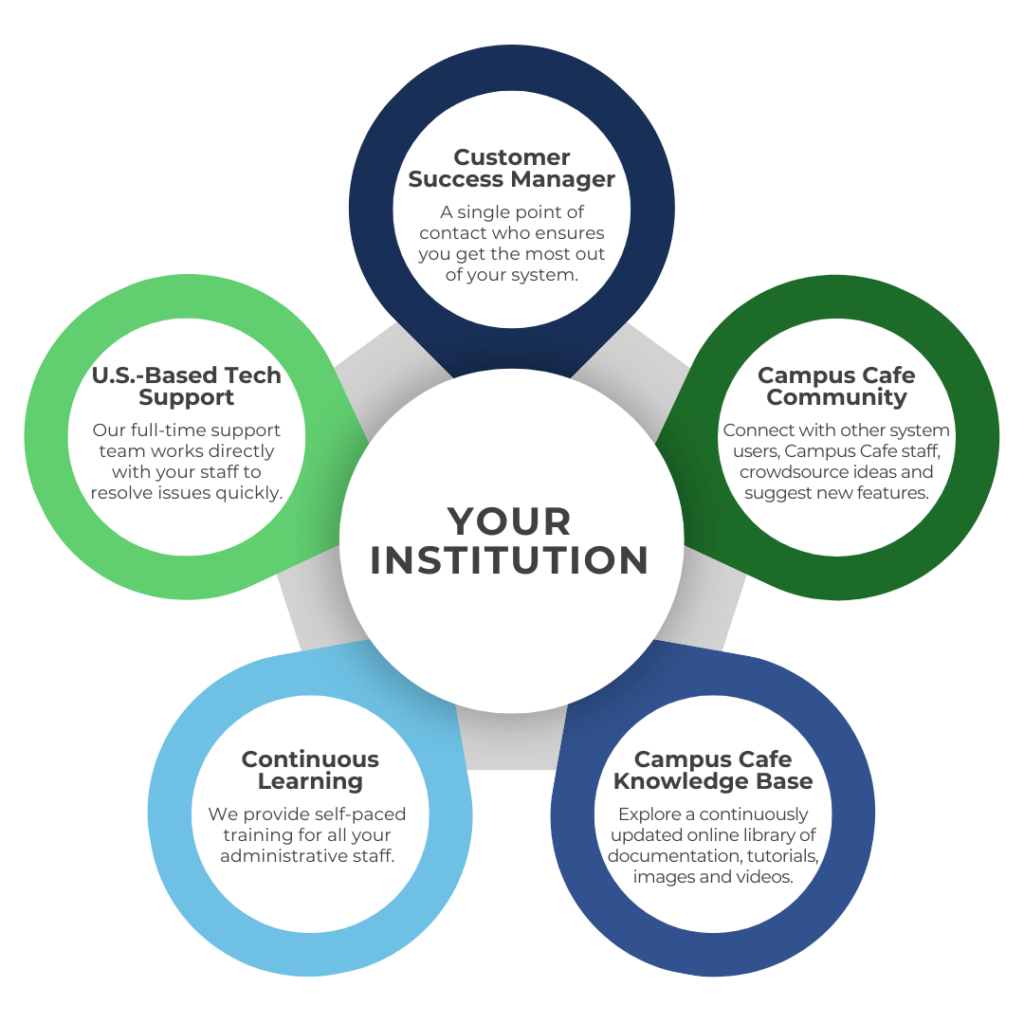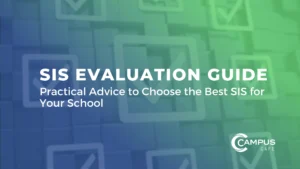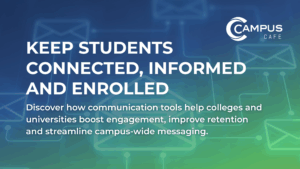
Why Vendor Stability Matters More Than Ever
As ed-tech companies consolidate and private equity firms expand their influence, higher education is seeing lots of changes. In these times, a stable, well-established SIS vendor has never been more essential.
When a community college, non-profit college, university, or career school partners with a technology provider, the platform’s capabilities often overshadow the company’s long-term stability. But, no matter how powerful the platform, if the company goes out of business or changes ownership, it can have massive implications for school-wide operations.
In recent years, some SIS companies have shut down their services, while others are in limbo and no longer providing security updates. For example Anthology, the owner of Blackboard LMS and Anthology Student SIS, recently filed for Chapter 11 bankruptcy. It will undergo a structured reorganization. But what does that mean for its customers?
What's Happening Across Ed Tech
Post-pandemic, private equity investment in ed tech has soared to record levels. According to Reach Capital, U.S. ed-tech investment deals hit $2.8 billion in 2023. These investments are credited with spurring innovation, including new solutions and more robust offerings.
However, financial backers also want to run profitable businesses and don’t hesitate to make changes for economic viability. That can even lead to shutting down a venture. For instance, private equity firm Insight Venture Partners invested in a former SIS, Illuminate Education, and several years ago announced plans to sunset the platform.
Why It Matters
So what happens if your vendor shuts down or changes its offerings?
Ideally, your tech partner will communicate that changes are coming, allowing administrators and technology leaders to evaluate other options. But sometimes services terminate with little warning.
By partnering with a financially sound and forward-looking technology partner, your school can insulate itself from that devastating operational upheaval and financial pressure. Vendor stability is essential for maintaining your school’s operations and ensuring the platform will continue to serve your school.
The Hidden Risks of Big Ed-Tech Vendors
Like many technology companies, some large SIS vendors have taken on investments from private equity firms, exchanging partial or complete ownership for cash infusions and investment firms’ expertise. While the capital can help an ed-tech company grow or scale, it also brings financial and operational risks.
The general playbook for a private equity firm follows a pattern: identify a growth industry, target companies with promising outlooks in need of investment, increase its value and then sell it for a profit.
Private equity money can help an emerging company quickly become a big player. Investment dollars can fuel new research and development, additional hiring, and expansion into other markets or products.
But the risk comes with tradeoffs and real-world impacts.
Once a private equity firm is in control, an SIS company can be vulnerable to changes in ownership and operations.
Risks and Impacts of Private Equity-Backed Ed Tech
Risk | Impact | |
|---|---|---|
Leveraged Debt
Many PE investments are “leveraged buyouts” funded by long-term debt placed on the company’s balance sheet, which saddles the business with high-interest payments that drain cash and limit investment. | New Pricing
To boost profitability, a new owner may institute price increases and pricing structures, adding an unexpected expense for schools and disrupting budgeting. | |
Pressure to Exit
PE firms typically look to exit their investments within three to seven years, which could run counter to a business founder’s long-term plans. | Altered Roadmaps
As technology changes, SIS vendors typically share a roadmap with clients detailing their plans, such as expanded staffing and new products and services. However, new owners could delay or scrap those plans. | |
Loss of Control
PE investors often take a majority stake or require strong voting rights, which could reduce founders’ and executives’ decision-making abilities. | Leadership Changes
If executives or key stakeholders leave, partner schools lose their familiar business contacts, which can disrupt relationships and future projects. | |
Business Churn
After a PE firm takes over, key employees and clients may leave or get laid off, destabilizing operations and jeopardizing revenue. | Reduced Support Services
Staff layoffs and vacancies in key areas like customer relations and technical support can impact response time, training and assistance. |
With Anthology, the new owners could opt to shut down the service, sell it or make changes, and any such action could create major problems for client schools.
When a PE firm gets involved with an SIS vendor, the consequences could range from minor adjustments to the worst-case scenario: disruptions or cessation of service.
It can be hard to separate credible and reliable SIS vendors from the hucksters. Don’t get swayed by low-cost estimates, lofty promises and too-good-to-be-true timelines.
What Happens If Your SIS Vendor Walks Away
Here’s the worst-case scenario for a college, career school or university: A private equity firm acquires your SIS partner and opts to shutter the business. An SIS is central to an institution’s operations, and even slight disruptions in service can throw a campus into chaos.
If your school’s SIS vendor goes out of business, here’s what could happen.
Loss of Support
No help desk, no troubleshooting. Your IT team is left to carry the burden alone.
Rushed Migrations
Leaders must quickly contract a new system, migrate data, and train staff, causing costly disruptions.
No Updates or Upgrades
Cloud-based patches, features and fixes stop instantly, leaving your system outdated and vulnerable.
Security & Compliance Risks
Without protection, schools face cyber threats, data theft and potential violations of student privacy.
Operational Disruptions
Admissions, registrar, financial aid and billing functions grind to a halt without SIS continuity.
Student Experience Impact
Students can’t register, access aid or pay bills, leading to frustration and enrollment risk.
The Case for Choosing a Higher Education-Focused SIS Partner
When you sign on with an ed-tech partner, it should be a long-term relationship. Many ed-tech companies fail because their features are over-complicated, they scale prematurely, the software doesn’t deliver, and poor user adoption. If private equity money is needed to shore up finances, it puts the company’s future in jeopardy.
Benefits of a Niche Ed-Tech Vendor
Conversely, working with an SIS vendor with a niche focus on higher education technology solutions offers stability, scalability and strong customer support.
Financial and Operational Independence
Independent companies like Campus Cafe don’t rely on private equity investment to stay afloat. As a result, they aren’t beholden to investors’ demands and plans, including changes in staff, reduction in budget and services, or a sale or shutdown.
Long-Term Product Focus
When the SIS is the center of a business, executives can focus on building that business, expanding services and supporting clients, with no distractions from investors and their changing plans.
Responsive to Customers, Not Investors
A right-sized, financially stable SIS partner answers to its clients, not stockholders or shareholders attached to a private equity firm. A client-led business plan enables SIS firms to concentrate on product development and customer service, rather than solely focusing on generating financial gains for investors.
Proven Track Record With Schools
No one can vouch for an SIS vendor better than its clients. An established SIS provider like Campus Cafe relies on the success of its customers to recommend its platform to other schools, driving continued success, future growth and product development.
Why Campus Cafe is Built to Last
Since 1986, Campus Cafe has offered colleges, universities, career, trade and technical schools a stable partnership with a strong customer focus, innovative products and a proven track record.
Unlike many ed-tech companies that outsource services to third parties unfamiliar with a school’s needs and operations – which can lead to slower support and client frustration – Campus Cafe maintains direct, consistent communication with every school.
Real-Time Account Activity
Every billing change updates instantly, giving both staff and students an accurate, current account view, with no manual refresh needed.
Integration Across Campus Cafe Modules
Our fully integrated, cloud-based platform delivers regular security updates to protect your school from cyberthreats and data breaches.
U.S.-Based Support
Customer support, training, implementation and help desk services are all provided by in-house experts who have worked in higher education.

The Formula for Success
Learn how our hands-on approach helps you optimize every feature to streamline campus operations.
How to Evaluate Vendor Stability
If your school is evaluating new student information systems, it is essential to understand a vendor’s financial and operational stability during the discovery process. Schools can ascertain that information by asking the right questions, digging into the company’s online details and talking to current customers.
What to Know Before You Buy an SIS
During your next discovery call with a potential SIS vendor, consider asking these key questions to find out whether the company is financially stable.
1. Who owns the company?
It’s a simple question. Find out who the firm’s or individuals’ prominent investors are. But don’t just take their word for it, do your own research.
2. What's the corporate history?
Research the company’s track record, including whether it has been sold, the number of owners, the executive team’s background, and its founding.
3. What is the exit strategy?
In your discussions with company leaders, inquire about their future plans. Do they plan to add staff and partner with more schools? Is there a product roadmap? Are there discussions to facilitate a sale down the line?
4. What is the business model?
Is the firm a large ed-tech company with numerous products and services, or is there a specific focus on SIS platforms?
5. How many customers use the software? What is the average length of customer retention?
A reputable and stable technology vendor should have multiple schools using its services. Ask about its average customer retention period. Long-standing relationships indicate satisfied clients and financial stability.
6. Who handles support and implementation?
For continuity and personalized service, you want an SIS vendor that offers an in-house team of technical and customer support professionals to help with migration, implementation and training, rather than outsourcing those services to third parties. It also indicates a commitment to a client-focused and comprehensive service.
7. What are the future expansion plans?
A well-established technology partner can share a roadmap for its long-term goals, including adding more staff, building new features, and upgrading technology, demonstrating its commitment to the industry and clients. Also, check their track record on releasing new features and upgrades: Did they launch on time or scrap any plans? If they deliver on schedule, it indicates successful forecasting and planning, a sign of strong operations and stewardship.
8. What do your current and former clients have to say?
The most important due diligence comes from talking to current and former clients. Ask the company for references, then probe those schools about service and support, implementation process, and whether timelines were met.
Takeaways for School Leaders, Administrators and IT Professionals
At a time when higher education institutions are juggling more duties with fewer staff, the right technology can help power operations, improve collaboration and enhance communication, while reducing costly errors and administrative workloads.
While the giant technology companies offer lots of bells, whistles and promises, it is likely not the best partner for your school. Campus Cafe stands in contrast to those behemoth ed-tech companies with outside investors, offshore customer support and expensive third-party services.
An independent, client-centered, and detail-oriented technology partner like Campus Cafe is nimble, with superior and reliable service that creates long-term value for schools.
Looking for a partner you can trust for the next 10 years and beyond? Schedule a personalized demo with Campus Cafe Software.





